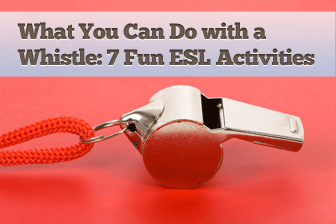What You Can Do with Food: 6 Games Your ESL Students Will Love


Use this great little instrument for some fun learning activities and games.
If you know it…blow your whistle!
Get your students in a TV game show type of mood. Divide them into two teams and have each team line up behind a desk with a whistle in the center. The students at the front must stand with their hands behind their backs. Show them a flashcard. The student who can name the object tries to grab the whistle first and blow it. If they do so correctly, they get a point for their team. Then, both students at the front go to the back of the line. You may ask them to use the word in a complete sentence or ask a question with it. This is also a great way to practice grammar points, for example, give them a verb and they must say it in past.
Blow the whistle on your classmate
Students need to learn to recognize mistakes in order to learn, whether they are their own or others’. Have a Q &A or drilling session, during which students take turns blowing a whistle each time a classmate makes a mistake. For example, drill your students on the First Conditional. The student with the whistle must blow it every time they think someone has made a mistake, and then correct it. When a student has correctly identified three mistakes, they must pass the whistle to another student.
Fill in the blanks
Try using a whistle the next time you give your students a dictation… dictations will never be boring again! Give them some gaps to fill and use the whistle to indicate where each gap goes: “Last weekend, I (whistle) to the park. It (whistle) a beautiful day. I (whistle) my bicycle for a while and then (whistle) some football with my friends.”
Pass the buck
Instruct a student to start writing a story on a sheet of paper. Tell him/her that when you blow your whistle, he/she must pass the sheet to another student. Once you blow the whistle they must stop writing; they can only finish a word, but not the sentence. After everyone has had the chance to contribute to the story, read it out loud to the class.
Word scavenger hunt
This is a wonderful game for young learners. Place different flashcards throughout the classroom on or under desks and chairs, or on shelves. Tell students they must roam around the classroom looking for “animals”. When they find one they must bring it to you and tell you what it is. At some point during the game, blow your whistle and shout out, “jobs”. Now, students must look for flashcards with these items. Then, blow your whistle and say “colors”. To make it more challenging, blow your whistle every minute or so, going from one category to the next.
Verb cop
Each day, make one of your students responsible for looking out for one verb. Give the student a whistle and a verb, for example, “go”. Each time this verb is used in any tense the student must blow the whistle and say whether it was used correctly in the sentence. You may choose to limit this to only specific drilling sessions or activities and not for the duration of the class. Make sure you tell your “verb cop” when they have to be on the alert for “infractions” and tell them if they did a good job at the end of class.
How high can you go?
Divide students into two teams and have them line up across from the board. One student from each team must run to the board and write down a word that fits into the category you will give them, for example, “weather”. After they write the word, they must run back and pass the marker to a classmate. They must start at the bottom of the whiteboard, and work their way up. The team that has reached the highest (written the most words) when you blow your whistle will be the winner.
Keep in mind there’s no better way to signal the start or end of a game, or to let your students know when they must transition into another segment of an activity.
If you need more ideas for ESL fun in the classroom, head to our ESL Essentials section. There you’ll find loads of tips, advice and how to articles that will make your job a lot easier!